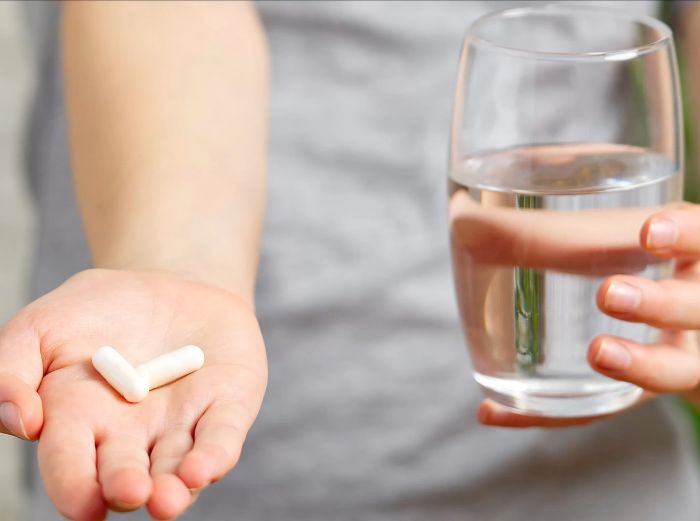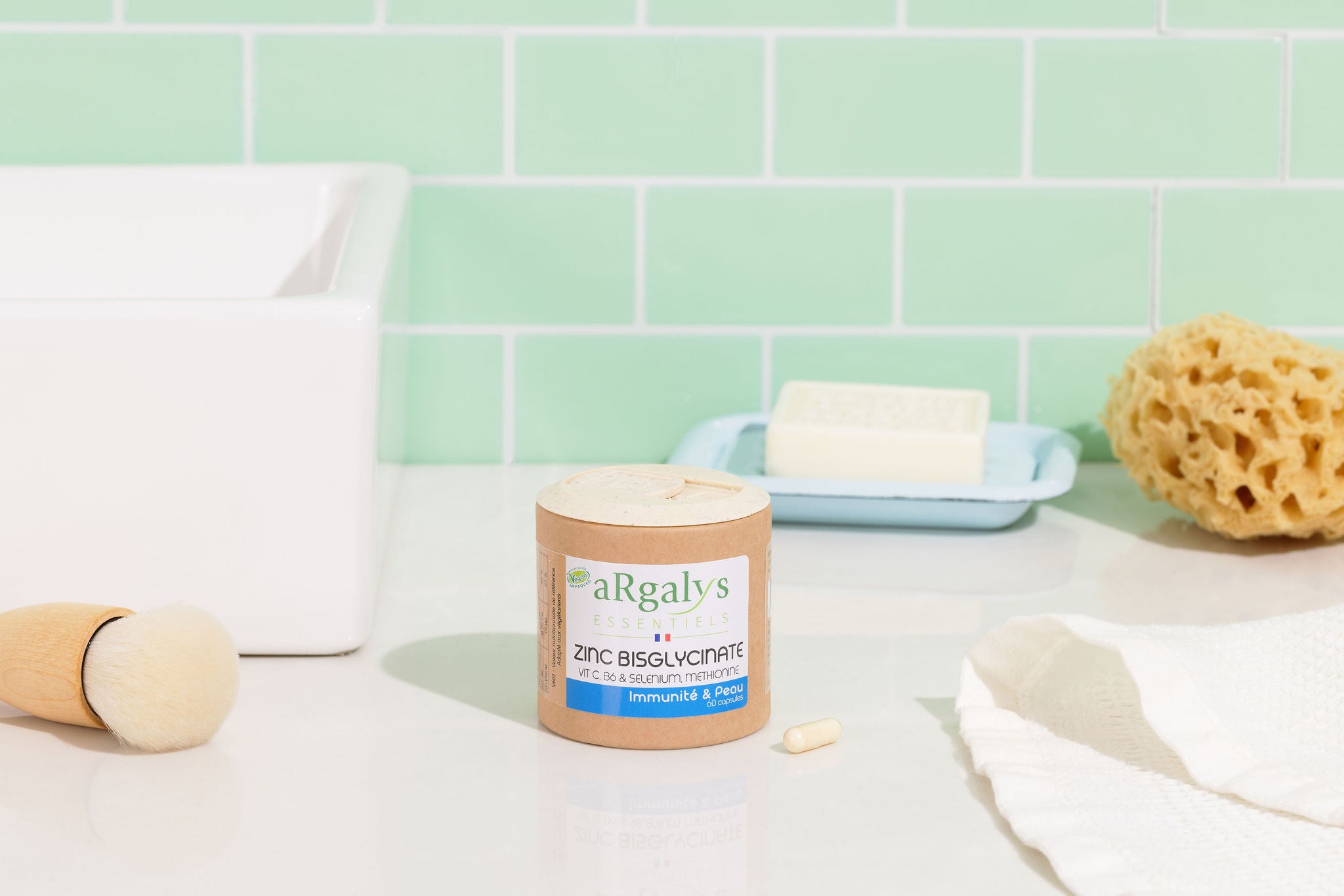Zinc is a trace mineral essential for many biological functions. It is involved in cell growth, metabolism, the immune system, and tissue regeneration. Zinc deficiency , which is relatively common, can have significant health consequences. This article discusses the causes, symptoms, and treatments for this deficiency, while guiding you on best practices for restoring optimal zinc levels.
The role and benefits of Zinc
Zinc is a fundamental element for your health. It is involved in more than 300 enzymatic reactions in the body, including nutrient metabolism, protein synthesis and tissue repair [1].
In addition to supporting your immune system , it helps produce defense cells like T lymphocytes. This strengthens your natural defenses against infections. Zinc also plays a role in hormonal regulation and DNA synthesis.
On the skin level , it promotes wound healing , regulates sebum production and reduces skin inflammation. A deficiency can therefore result in skin problems, such as acne or slower healing.
The origin of a zinc deficiency
The causes of zinc deficiency are mainly related to diet. Meat products and seafood are rich in zinc, but vegetables have relatively low levels, and the presence of phytates in cereals and legumes further reduces zinc bioavailability [2].
Diets that are predominantly or entirely plant-based are more likely to induce zinc intake deficiencies .
Certain diseases, such as Crohn's disease or celiac disease, also affect nutrient absorption. If you have these conditions, your risk of deficiency is higher.
Pregnancy and breastfeeding also increase zinc needs , so it is important to adjust your diet during these times.
Symptoms of Zinc Deficiency
If you are zinc deficient, several non-specific symptoms may appear. Here are common signs to look out for:
- Frequent infections : A weakened immune system can make you more vulnerable to colds and other infections.
- Skin problems : You may notice acne , dry skin, or slower healing.
- Hair Loss : Unusual hair loss can be a sign of deficiency.
- Altered taste and smell : Since zinc is involved in these functions, a deficiency can affect your taste and smell perceptions [3].
- Fatigue : If you often feel tired, it may be related to a zinc deficiency.
The consequences on the body
Prolonged zinc deficiency can lead to serious health problems.
It weakens your immune system , increasing susceptibility to infections. In men, a deficiency can affect fertility, as zinc is essential for sperm production [4].
For children, zinc deficiency can slow growth and impact cognitive development, as zinc plays a role in DNA and protein synthesis.
If the deficit persists, seniors risk complications linked to greater bone fragility [5].
How to increase your zinc level?
If you suspect you may be zinc deficient , it's important to act quickly. A blood test can be helpful in measuring your zinc levels. It's always recommended to consult a healthcare professional if you suspect a deficiency, as only they can assess your needs and direct you toward the best solution.
Adjust your diet
Animal products, such as red meat, poultry, and seafood (especially oysters), are the richest in zinc.
For diets that are predominantly or entirely plant-based, their lower levels and lower absorption, linked to the phytates present in cereals and legumes, must be taken into account. Two reasons that encourage increased vigilance.[6].
Zinc supplementation
If your dietary intake is insufficient, or if you have difficulty absorbing zinc , supplementation may be necessary. Food supplements in the form of zinc bisglycinate are particularly recommended, as this form is better absorbed and tolerated by the body [7].
The dose of zinc in the body
The amount of zinc you need depends on several factors, such as age, gender, and your body's specific needs.
Typically, the recommended daily zinc intake for adults is 8 mg per day for women and 11 mg per day for men. These doses are adjusted based on increased needs in certain populations, such as pregnant or breastfeeding women, who may need 11 to 12 mg of zinc per day to support fetal growth and milk production.
It is important to note that these recommendations relate to combined intakes from food and, if necessary, supplements. If you take dietary supplements, be sure to follow these doses to avoid the risk of overdose.
The risk of overdose
As with all other micronutrients, excess zinc is unnecessary and can lead to adverse effects.
The upper safety limit (ULS) for adults is 25 mg per day. In practice, adverse effects are observed with sustained intakes above 40 mg per day [8].
Overdose, usually caused by excessive dietary supplement intake, can cause symptoms such as nausea, vomiting, and diarrhea. Excess zinc also disrupts copper metabolism.
When taking supplements, be sure to follow the dosage instructions on the product and consult a healthcare professional if in doubt.
Conclusion
Zinc is a trace mineral essential for many bodily functions. A zinc deficiency causes a variety of symptoms and discomforts, ranging from fatigue to skin and fertility problems.
Eating a proper diet or taking a zinc supplement can help eliminate this risk. Don't hesitate to consult a healthcare professional if you have any concerns about your zinc levels, and always follow the recommended doses to avoid overdose.
References:
- “Zinc and human health: An update” - https://pubmed.ncbi.nlm.nih.gov/23836054/
- “Dietary phytate reductions improves zinc bioavailability in humans” - https://pubmed.ncbi.nlm.nih.gov/18810217/
- “Taste and smell dysfunction in zinc deficiency” - https://pubmed.ncbi.nlm.nih.gov/11686092/
- "Zinc in male reproduction" - https://pubmed.ncbi.nlm.nih.gov/16099115/
- "Zinc and bone metabolism" - https://pubmed.ncbi.nlm.nih.gov/19324493/
- "Zinc bisglycinate: A highly bioavailable form of zinc" - https://pubmed.ncbi.nlm.nih.gov/31089723/
- "Zinc toxicity and tolerance levels" - https://pubmed.ncbi.nlm.nih.gov/30387858/
- Vidal: https://www.vidal.fr/parapharmacie/complements-alimentaires/zinc.html
 04 74 03 98 80
04 74 03 98 80










